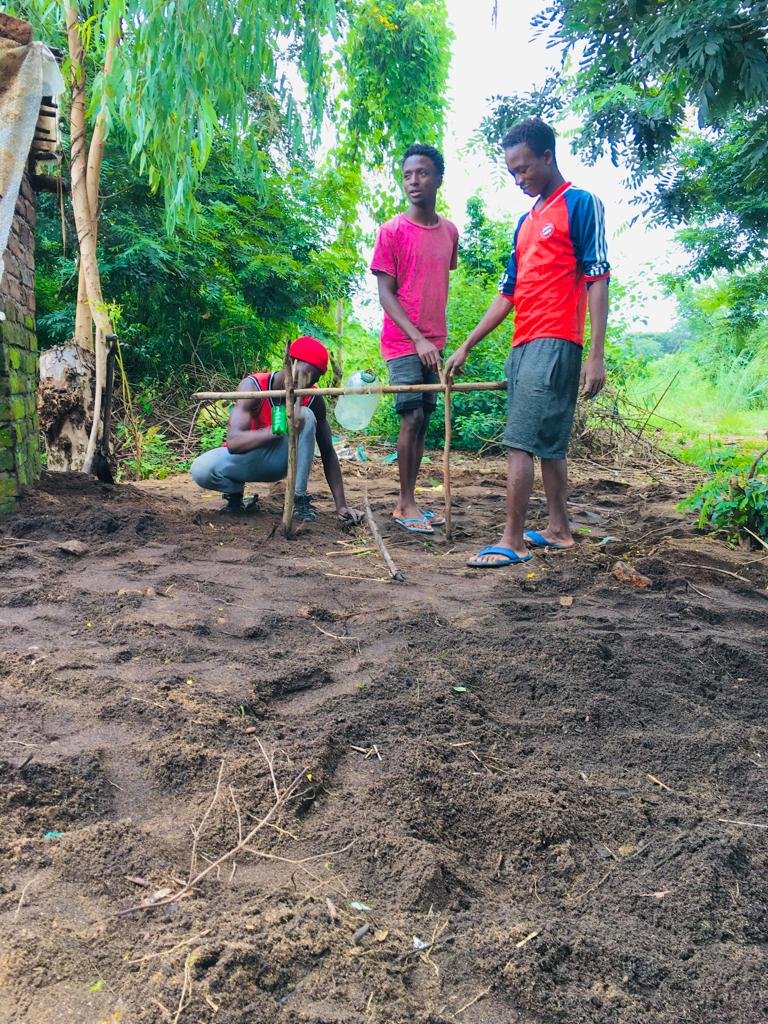Youth With a Vision
The lake flies are intense as we cycle along the dusty road to Mazembe. We pass through thick clouds of them and do our best not to inhale too deeply. We walk our bikes when the sand gets too deep and wind our way along the overgrown paths until we arrive at the tiny church. No one is there to meet us, so we continue on our own until we see a familiar looking group of youth standing around a partially completed chicken coup. Mussa hurries over and greets us warmly, insisting he walk my bike for me. I’m touched by the sweet gesture. He’s wearing a ripped purple t-shirt that reads: “You Can’t Touch This.” It makes me smile. The rest of the boys give us big grins, handshakes and fist bumps as we arrive.
They are Youth with a Vision, founded by Ackim Manda two years ago.
At 21, Ackim faced the same problem as many post-secondary school students in his village: what now? For many, the answer is mischief. “We’ve got problems here,” he says. “So many kids are turning to alcohol.” He is working hard to offer them another option. His goal for the group is straightforward: be a positive influence in the community.
Now 23, Ackim has a gentle but commanding presence. When he talks, these kids listen. And over the last two years, he’s put together quite a team. The group meets weekly for planning on Sunday afternoons and their projects are varied. They dig pit latrines. They build and maintain kitchens for community members. They do road maintenance. They clean the local dispensary. Next week? They’re partnering with another local youth group and traveling to Mzuzu for a weekend of sharing ideas about how to create positive changes in Malawi. Ackim proudly tells me about the projects they’ve done so far and sends me some photos.
In addition to their weekly Sunday meetings, Youth with a Vision also meets regularly with Watson and Rebecca, who lead Ripple Africa’s Family Planning and Sexual Health Project. They discuss a wide variety of topics including healthy relationships, sexually transmitted infections and diseases, responsible family planning and sustainable farming and agriculture, to name a few. At one of these meetings is the first time we meet the group, and I am inspired by their willingness to engage openly in sensitive and challenging topics of conversation. They are welcoming and inquisitive about us and ask thoughtful and insightful questions.
It’s 7:15 on a Saturday morning and today they are working on their communal chicken coup. They’ve invited me and Ruaridh to help. When we arrive, they’ve already been working for an hour. When it’s finished, a handful of members will contribute chickens to the coup. Once they have chicks and eggs, they’ll sell them, and the money will be cached to use for future group projects. It’s been a methodical process. They’ve saved money for each set of supplies and are completing it one step at a time.
This is the third time we’ve met this group in two weeks, and already they welcome us as part of their team. They laugh and joke with us and pose unabashedly for photos. Today their goal is to get the roof on the coup, and they are well on their way when we arrive. I’m so impressed with their resourcefulness as we work. There is always a solution. They focus on what they can use, not what they are lacking. Mussa patiently gives Ruaridh and I instructions so we can help. He laughs at our machete skills and makes sure we are careful as we cut lengths of bamboo for the roof beams. We help them separate string from an old fishing net, and they show us how to secure the beams using the string and long pieces of the soft insides of a pine log. I ask Ackim how they know what to do. He says they asked for advice from members of the community before they started. “Everyone knows how to build stuff around here.” he says with a smile.
When Ackim cuts his finger with a machete, he’s barely fazed. He makeshifts a bandage with a piece of foam and some string and carries on working. I insist on cleaning it and putting on a new dressing. I feel a twinge of fear knowing how easily it could become infected and give him strict instructions to visit the clinic at the first sign of trouble.
They work for a solid two hours, and I’m amazed at their progress. By the time we leave, the coup has a solid roof that holds Davies’ weight, they’ve covered it in grass that Ackim and the girls have cut from a nearby field, and they’ve finished the front of the enclosure where they’ll put a door.
They pool their money for a simple breakfast - cassava - a staple around here. Next week, they’re hoping they’ll be able to finish the enclosure completely, but this afternoon, they’re heading to visit a fellow member: Dyna. She was bitten by a scorpion, and they want to make sure she’s OK.
No doubt this club could use some extra money. They’re regularly in need of supplies: tools, timber, etc. But they’re not interested in hand outs. A hand up? That they will take. They’re a resourceful bunch. They want to do the work; to learn the skills. The best part? This group - the community they have built - is giving them a sense of purpose they might otherwise struggle to find.
Ackim seems keenly aware of the need for change here. It’s brave to be the first one to do try doing it a different way, I tell him. He just smiles. He’s not looking for credit. He’s interested in giving his community a hand up. And that’s just what he and these youth are doing, so incredibly well.































